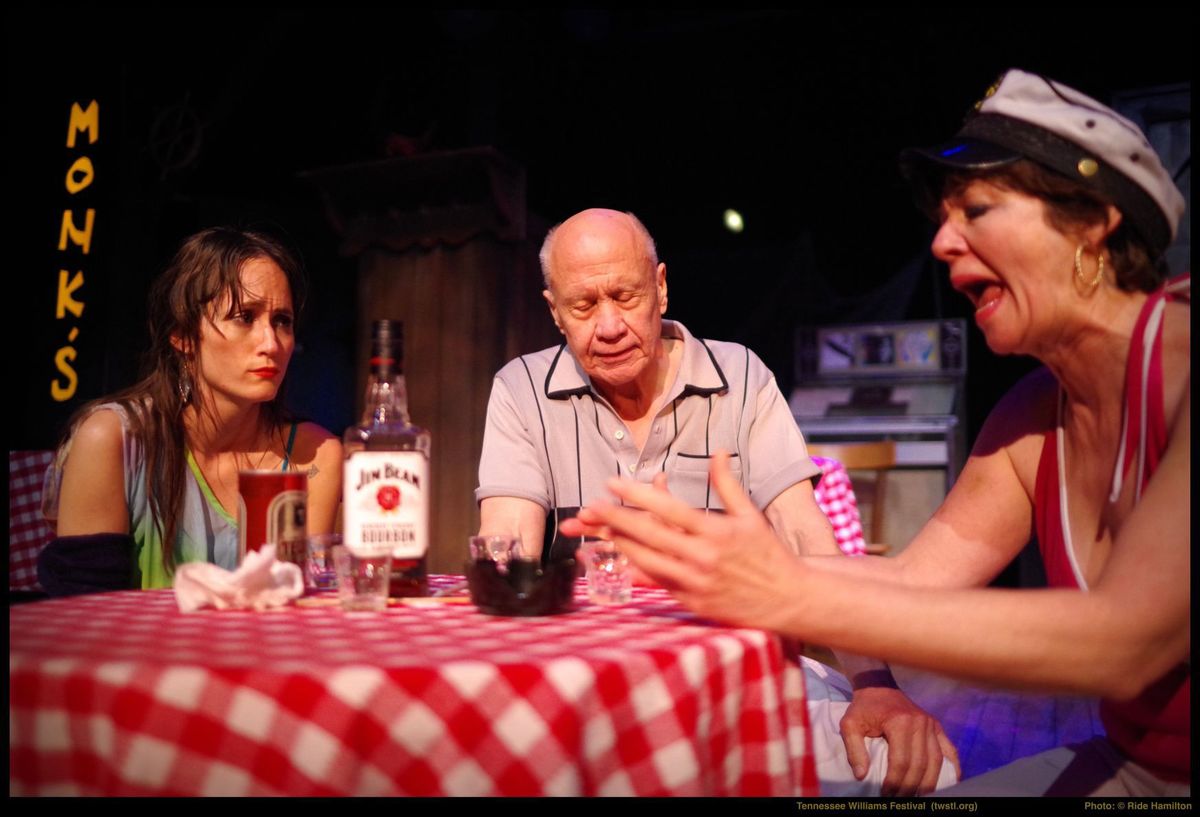
'Small Craft Warnings' searches for a glimmer of hope in the bottom of a glass
By Tina Farmer
Humans are curious, pernicious animals, incredibly resilient and capable even as their lives spiral in and out of their control. We experience a full range of emotions and can be as profoundly moved by pain as by beauty; but just as often, we hide behind convention and seek comfort and the familiar over the genuine. Playwright Tennessee Williams explores the insistence of human nature in the deeply confessional and occasionally unsettling Small Craft Warnings.
Set in Monk's bar, a rundown dive on the coastal shoreline, the story introduces us to a cadre of broken individuals who nonetheless retain the will and fire to connect with others and experience the fullness of life. These are not the lives of the comfortably well off or aspirational working class, but rather the perpetual struggles of people who live on the margins. The crowd at Monk's on this particular night includes high functioning addicts, the displaced, and the underemployed. People you pass by on the street and try not to notice for fear of being asked for a contribution or ending up on the barstool next to them yourself.
Peter Mayer's pleasantly gruff Monk does his best to keep the place up, but he's slowly losing ground and there's a palpable sense of loneliness in his demeanor. He's generous to his customers and perhaps too softhearted to do much more than get by. He moves slowly and deliberately, wanting to keep the peace among his regulars and almost suspicious of newcomers to his little hole in the wall. Mayer gives the barkeep a tender disposition, but he's tough when he needs to be and knows just how to smooth things over with the local police.
Elizabeth Townsend's deeply troubled Leona is the center of the story simply by force of personality. By turns prodding, cruel, and inconsolable, she's on a bender to mark the anniversary of her bother's death and no one escapes her aim. A transient hairdresser, she's also come to the conclusion that she's spent too much time in this town and bar, but she's not leaving until everyone hears what she needs to say. Townsend gives Leona steely determination, acerbic wit, and a "take no prisoners" attitude that is at times abrasive and unkind, but filled with an undercurrent of need.
Local lothario Bill gets a confidant swagger from Eric Dean White. He's on the prowl, looking for solace and sexual sympathy after a falling out with Leona. Magan Wiles' Violet needs a drink, a meal, and a place to stay. Though she's much abused by Leona, it's clear her own choices have landed her here, all her belongs in the suitcase at her feet and all her hopes in the sympathy of the other regulars. Jared Sanz Agero, as Steve, openly pines for Violet, but is resigned to playing second-fiddle to her whims. John Bratkowski's Quentin and Spencer Milford's Bobby share a different romantic disappointment, one masked in vaguely defined expectations and mistaken pretense.
Finally, there's Doc, played with the mannerisms and predilections of the playwright by Jeremy Lawrence. The good doctor has lost his license but that doesn't prevent him from administering to the local population, most of whom are too poor to afford reliable care. A man with a deep appreciation for the miracles of birth and death, he continually finds bits of wisdom at the bottom of his shot glass. Together, these companions share the drama that's found on the edges of existence, where a drink may be the only bright spot in a day of struggles.
These are not the most sympathetic of characters, each is full of faults, but their stories resonate with genuine realism. We may not like them. We may look at them and consider ourselves lucky not to be in their position. But deep down, we recognize them. The need for connection, the desire to live life fully, and the contrasting fear of the pain -- these feelings are frequently unpleasant, but absolutely necessary to our existence. The ensemble finds the poetry in Williams' hard luck stories and makes us care what happens even as we thank our lucky stars that these situations are far from our own.
Director Richard Corley skillfully guides the actors, peeling back the carefully constructed masks they wear for the rest of society and revealing heartbreaking truths. Though we only see one side of their personas, we quickly get the sense that some of these characters are more able to blend in than others. It's a subtle demarcation that results in an unstated hierarchy -- one that works to fantastic effect. The rundown dive bar, designed by Dunsai Dai, has a recognizable quality to it; when combined with Michael Sullivan and Michael Perkins' lighting and sound design the result is a space filled with a haunting loneliness and sense of authenticity.
Small Craft Warnings, running through May 14, 2017 as part of the second annual Tennessee Williams Festival St. Louis, openly questions our will and ability to continue to press on no matter the circumstances. The characters are compelling if not always appealing, and buoyed by excellent performances and strong direction from Corley that brings their stories to life. The result is a surprisingly intimate and moving production that captivates even if it occasionally makes you cringe.


